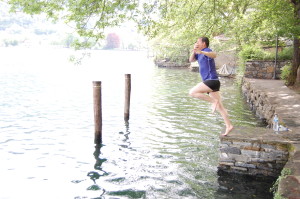20 Months into a 50 Year Retirement
This blog post was originally written for a sister website called The Matrix Experiment. We set up the site in January 2017 to pass on financial hints and tips we’d learned as we became financially free. The Matrix Experiment site no longer exists, so we’ve incorporated this financial information here. After publishing this post we wrote The Non-Trepreneurs, a fully-fledged book which describes how we achieved financial independence in detail.

Aged 43 we quit work about 20 months ago, making us ‘early retired’, ‘financially independent’ or ‘financially free’, whatever you want to call it. Realistically, we could survive into our 90’s (yeah, if I poured all this beer away maybe…), which gives us a potential 50 year ‘retirement’ ahead of us. It’s in quotes, as we will likely continue to work in some fashion of our choosing, but most folks understand ‘retired’ over ‘financially independent’ so I’m interchanging the two.
What does it feel like to be at the start of a 50 year retirement?
It feels unreal.
Our shift into a world where work became optional was a deliberate one, although it was largely powered by accident. Neither of us woke up aged 20 and thought to ourselves ‘I’m gonna be free by 43, dammit, I’m gonna save 50% of what I earn and invest it, woo hoo!’ Instead we took the same paths everyone else takes for half our lives. Only at age 40 did we decide to build up enough investment income to enable us to travel without working, and clearly three years isn’t enough time to do that. But we’d already accidentally done it, by:
- Investing in ourselves so we had the in-demand skills to enable us to quickly generate cash through contract work
- Buying two houses to live in, and not selling them, giving us rental income
The process we went though over those 2 or 3 years is perhaps the subject of a future post, but for now the point is, in the end, we didn’t get pushed across the line. We didn’t experience a windfall which shoved us into this position, we pulled ourselves up a rope to get here, so why should it feel unreal? We did the thinking. We looked around us and saw the opportunity to just behave a little differently to others. We assessed the risks, and we took the action. It was all quite ‘on purpose’. So why does it feel unreal?
I don’t know the answer, if I’m honest. I suspect it has everything to do with the fact the world around us seems to be heading in the opposite direction. Folks save little and invest even less. Folks buy what they think are ‘investments’ only to find that the ‘investment’ is costing them money, rather than creating the stuff. Folks buy stuff, which they can ‘afford’, but only at the unseen cost of years of future work. Folks focus on the external reasons why they can’t build a financial safety net, rather then holding up a mirror and looking at the real, controllable reasons.
This sense of surrealism translates into an ongoing background fear for me.
Less so (much less so) for Ju. We’re well outside the mainstream here, although I really don’t feel like we’ve done anything particularly extreme. We spend a fair bit of time in a motorhome, but we don’t need to, we have part of a bricks ‘n’ mortar house in the UK we can just as easily live in. But wherever I come across articles in the mainstream UK media about early retirement, none of them suggest a 50 year retirement is feasible. For good reason I guess, as they’re putting out information to millions of people who have practically zero financial education, many millions of whom are or will be dependant entirely on the state pension to live. So they have to write for the uninformed average.
Anyway, what is this fear? The usual stuff I suspect, about running out of money or some massive unforseen catastrophe hitting us. None of it makes a great deal of sense, as we’ve a whole bunch of protection measures in place (we still live on less than we have coming in, we have many small income streams from different types of asset, a cash buffer big enough to support at least two years living costs, liquid assets we could use for at least five more years living costs, the option to seek out work and so on). But for me a small, background fear persists. Maybe it always will.
We’re also seriously, seriously awash with time.
As we’d already taken a two-year-gap-year before we went off down the early retirement route, I had some idea of what we’d find in terms of time. But it still comes as something as a shock, on a daily basis, just how much time we have available to us. Taking into account all of the time we needed to work – including the hours we worked for free – my guess is we freed up about 60 hours each a week. 60 hours is a lot of time to fill with something else each and every week, and is an ongoing challenge. When we’re travelling across Morocco, we can easily do that. But when we’re not, we’re continually seeking out things to keep our minds running (you’re reading one of ’em). I’ve been tempted to go back to work purely to avoid this lead-like load on my weak imagination.
It also feels quite normal at times, and at others I’m euphoric.
I don’t normally know or care what day it is. I’ve grown entirely used to no longer having either the Sunday night dread nor the Friday afternoon excitement. The idea to me that we could opt to spend a winter living in the Alps, or a summer in the Arctic, is quite normal. But then at other times the impact is intense: the realisation, again sudden and new, that it’s reasonably certain we won’t be forced into work again, releases a euphoria I imagine would be illegal if induced with drugs.
On a practical level, we’re continuing to save and invest.
Stepping outside the deep, dark recesses of my soul, and into the brightly lit domain of Microsoft Excel, our finances are looking good. I’m not bad at the big picture, but awful at the detail. Fortunately for me, Ju is great at the detail and keeps a track of everything we spend and earn. Everything. Every penny. It might sounds bonkers and less than fun, but it bloody well works. At first this kind of tracking helped us stick fingers in the many monetary leaks we had, saving us thousands which went into paying off a mortgage instead. Now we know where the leaks are, and deliberately let ’em flow, as they’re there for a purpose (fun). But carrying on with this level of tracking makes completing tax returns, reporting back to blog readers on finances, and knowing where we are financially a breeze.
The tracking is showing us we’re still living below our income – which has been pushing roughly £5k a year into more investments. This is something I never imagined, that we’d still be saving about 25% of our income post retirement. When I think about it, it seems quite mad, when folks in the UK save on average less than 10% of their income?
Before I close this rambling post off, a note about flexibility.
50 years is a long time to be retired. In some senses it is extreme, I accept, but we’ve met folks who are well on the way. A few months back we met a couple who’d been travelling for 30 years, and still had decades of life left in ’em. Another theme which often comes out in mainstream commentary on retirement is an assumed inability to be flexible. Financial experts obsess over the ‘safe withdrawal rate’ – how much you can take out of a portfolio of stocks and shares each year without fear of it running out – should it be 2%, 3%, 4%? The discussion is important, as you’ll need twice as big a retirement fund to retire at 2% than at 4%, which equates to a LOT more working to get there. But this type of commentary almost always makes an assumption that you’ll be completely inflexible. If you’re flexible, you can get that percentage payback up towards the 4% region, so even though we don’t need that level of return, we’re aiming to remain financially bendy to almost ensure our chances of 50 year success:
- We already live on less than we earn, granting us an additional 25% buffer zone.
- We’ll keep enough cash on hand to avoid being forced to sell shares or bonds in market troughs.
- We can spend less if necessary on day to day living costs, without having to go back to work.
- We can seek out new forms of work – like book writing or blogging.
- And finally we’ll go back to work if things go really bad (or if we just fancy doing some real work for a change). We’d likely only need a modest income.
On the flip side, once we’re aged 55 and our private pensions start to kick in, our income will start to go up. At 67 we **should** get a percentage of the state pension (if not all of it, if we opt to buy enough qualifying years), again shoving our income up. And at some point we’ll need to ramp up our spending so we get through the underlying capital. So we’ll need to remain flexible in both directions – spending more in order to avoid dying rich – which I imagine will be a challenge.
Last of all, I should make it clear that I enjoy this weird and wonderful life. It’s unusual. It makes me think about how the world works, how people behave, what motivates us to do what we do. It gives me something to write about.
Cheers, Jay


